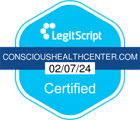
Consciously deciding to understand and overcome anxiety requires courage, support, and the right guidance. At Conscious Health, our anxiety treatment center, we provide a comprehensive approach to navigating the complexities of anxiety disorders. Our mission is to illuminate your path to healing with expertise, empathy, and innovative treatments.
Anxiety is not a monolith but a spectrum of disorders, each having their own unique characteristics and challenges. From Generalized Anxiety Disorder (GAD), marked by pervasive worry, to Social Anxiety Disorder (SAD), characterized by a fear of social situations, understanding the nuances of your anxiety is the first step toward effective treatment.
Heal from the complexities of your anxiety. Schedule a session to feel fast-acting relief today.





Our Anxiety Treatment Center stands as a beacon of hope, offering personalized anxiety therapy to navigate all anxiety symptoms. By combining counseling with innovative treatments, we tailor a therapy plan that addresses your unique needs, including psychotherapy for generalized anxiety. Our therapy model combines ketamine administration and the principles of transpersonal psychology to treat every aspect of you, including spirit and consciousness (Transpersonal Therapy), in conjunction with other therapies like TMS, EMBP and Biofeedback.
As shown, this method incorporates various practices, modern and ancient, for wrap-around healing and overall well-being.
Let us tailor a therapy plan that resonates with your journey.
Anxiety manifests in various forms, from anxiety chest pains and chest tightness due to physical stress responses, silent panic attacks, and even anxiety tics. Identifying these manifestations is crucial for a tailored treatment approach, including where previous treatment attempts have failed, referred to as Treatment-Resistant Anxiety.
At Conscious Health, we specialize in addressing treatment-resistant anxiety, a condition characterized by persistent anxiety symptoms that do not respond to traditional treatment methods. This form of anxiety can be incredibly challenging to manage, as it often resists conventional therapies and medications, leaving individuals feeling helpless and without options. Understanding treatment-resistant anxiety is the first step toward finding practical solutions. It refers to anxiety disorders that have not improved significantly after trying at least two different therapeutic interventions, indicating a need for alternative approaches.
In response to this need, we offer advanced therapies tailored to combat both treatment-resistant anxiety and depression, recognizing that these conditions can occur independently or coexist, compounding the complexity of treatment. Our anxiety treatment program includes the innovative use of Ketamine, a breakthrough in the medication for treatment-resistant anxiety. Ketamine has gained attention for its ability to provide rapid relief from treatment-resistant anxiety and depression symptoms, particularly in cases where other treatment-resistant anxiety medication options have fallen short.
By integrating the groundbreaking medication into our treatment plans, we aim to open new doors for those who have struggled to find relief, offering hope and a path forward for individuals facing the dual challenges of treatment-resistant anxiety and depression. Our commitment is to provide a compassionate, comprehensive treatment approach, ensuring that each person receives the personalized care necessary to navigate their journey toward healing and well-being.
If you’re experiencing treatment-resistant anxiety, we’re here to help. Contact us to navigate through your anxiety with a modern approach and tailored care.
Understanding the nuances between OCD, its types, and its distinction from conditions like OCPD and ADHD is crucial for effective treatment. While OCD is recognized as an anxiety disorder, it manifests through unique obsessions and compulsions, distinguishing it from other anxiety-related conditions.
Treatment at Conscious Health includes targeted therapies for various Types of OCD:
Obsessive-Compulsive Disorder (OCD) and Obsessive-Compulsive Personality Disorder (OCPD) are distinct conditions, despite their similar names. OCD is characterized by unwanted, obsessions and compulsions performed to relieve the anxiety caused by these obsessions. It’s recognized as an anxiety disorder where the individual acknowledges these obsessions and compulsions as irrational.
OCPD, on the other hand, refers to a personality disorder characterized by a pattern of being preoccupied with the need for orderliness, perfectionism, and control without the presence of true obsessions and compulsions seen in OCD. Individuals with OCPD believe their way of thinking and acting is perfectly reasonable and may not recognize their behavior as problematic, which is a key difference from the insight typically seen in OCD.
At Conscious Health, we understand the complexity of OCD and the anxiety it brings into the lives of those affected. Our OCD and Anxiety Treatment Center is dedicated to providing the best OCD medication alternatives and therapies, tailored to each individual’s unique needs.
For those facing the challenge of treatment-resistant anxiety, exploring innovative treatments such as Ketamine for Anxiety offers new hope. Our center remains at the forefront, integrating such options with traditional therapies to find the best approach for you.
Explore innovative treatments that could offer you relief. Learn more about advanced anxiety therapy options.
Supporting someone with anxiety, whether they’re dealing with sexual performance anxiety, social anxiety in relationship building, or the effects of alcohol and anxiety, requires understanding and empathy. Providing a supportive environment and encouraging professional help is critical.
Learn how to support a loved one with anxiety. Reach out for resources and guidance today.
Recovery from anxiety is marked by understanding and managing symptoms. Recognizing signs of recovery, such as learning how to lower your anxiety levels, is a testament to your progress and leads to quick anxiety relief when symptoms occur down the road.



Through the expertise of Dr. Brad Zehring and the clinical team at Conscious Health, you will experience the latest and most effective treatment for the various anxiety disorders. Our unique holistic treatment modalities are designed to meet you where you are.




Navigating through anxiety disorders, from Generalized Anxiety Disorder to specified anxieties like phobias, or sexual performance anxiety, with the support of our treatment center, you can discover a life beyond anxiety. If you’re exploring anxiety counseling, our holistic approach offers a path to tranquility and empowerment.
Electoenehalogram (EEG) Scans & Neurofeedback
Psychopharmacological Therapy (Psychotherapy & Ketamine)
Noninvasive Procedures (TMS & EMBP)
Our commitment is to provide you with a compassionate, personalized approach to anxiety treatment, empowering you to overcome the challenges of anxiety disorders. Whether you’re confronting generalized anxiety disorder, social anxiety, or seeking ways to manage anxiety symptoms, we’re here to support you every step of the way. Join us on this journey towards healing and discover a life where you are in control, free from the constraints of anxiety.
Begin a transformative journey with us. Contact our Conscious Health today and take the first step towards a life defined by peace, strength, and fulfillment.
Anxiety disorders are a group of mental health conditions characterized by excessive, persistent, and often irrational feelings of fear, worry, or apprehension. While everyone experiences occasional worries, anxiety disorders involve intense and overwhelming distress that can interfere with daily life.
Symptoms can vary but often include restlessness, racing thoughts, irritability, muscle tension, difficulty concentrating, and physical sensations like a rapid heartbeat or shortness of breath. These symptoms can be severe and persistent, impacting both mental and physical well-being.
Yes, anxiety disorders are treatable. Effective treatments include psychotherapy (such as Cognitive-Behavioral Therapy or CBT), medication, and lifestyle changes. A combination of therapies tailored to an individual’s needs often yields the best results.
Medication can be helpful in managing anxiety disorders, especially when symptoms are severe. However, it’s not the only option. Therapy, lifestyle changes, and self-care techniques can also play a significant role in treatment.
Anxiety is a common response to stress, but when feelings of intense fear or worry persist, it could be a sign of an anxiety disorder. Common symptoms include restlessness, increased heart rate, difficulty concentrating, and sleep disturbances. If these symptoms are persistent and affect your daily life, it’s important to consult a healthcare provider for a proper evaluation. While a definitive diagnosis can only be made through a clinical assessment, if you’re experiencing these symptoms, the best course of action is to reach out to us at Conscious Health to receive a diagnosis, as well as effective treatment.
Yes, there are medications that can treat both depression and anxiety. One such option is Ketamine, which has been successfully used in cases of depression and anxiety disorders. It works differently from traditional antidepressants and offers fast acting, long lasting relief, including when other medications haven’t been effective. However, it’s important to discuss with our specialists at Conscious Health whether Ketamine is a suitable treatment option for your individual needs.
Yes, anxiety can cause shortness of breath. When experiencing anxiety, your body’s fight-or-flight response is activated, leading to physical symptoms such as increased heart rate and rapid breathing. This can result in feeling short of breath or as if you’re not able to get enough air. If you’re experiencing frequent episodes of shortness of breath associated with anxiety, it’s important to seek specialized, professional help at Conscious Health.
Determining if shortness of breath is due to anxiety involves noticing additional symptoms and the context in which it occurs. Shortness of breath from anxiety often accompanies other signs of anxiety such as rapid heartbeat, sweating, dizziness, or a feeling of panic. It typically arises in response to stress or when worried, rather than being constant or only present during physical exertion. If you’re unsure whether your shortness of breath is caused by anxiety or another condition, reaching out to a healthcare provider is the best course of action.
Yes, nicotine can cause anxiety. While some people use nicotine products believing they reduce stress, nicotine can increase anxiety levels. It stimulates the release of certain neurotransmitters that can heighten stress and anxiety, especially after the initial effects wear off, leading to a cycle of dependence and increased anxiety symptoms over time. If you’re experiencing elevated anxiety and use nicotine products, consider reaching out for support from our team.
Yes, anxiety can indeed make you tired. The constant state of heightened alertness and the stress response associated with anxiety can be exhausting, both mentally and physically. This can lead to feelings of fatigue and decreased energy levels, even if you’re getting enough sleep. The effort to manage anxiety symptoms daily can also contribute to overall tiredness.
Anxiety tics are involuntary movements or sounds that occur as a physical manifestation of anxiety. These tics can vary widely among individuals, ranging from blinking, twitching, throat clearing, or making small noises. While not everyone with anxiety experiences tics, they can be a response to heightened stress levels, serving as a physical outlet for internal tension.
While passing out during an anxiety attack is relatively rare, intense anxiety can lead to symptoms that may feel like you’re about to faint, such as dizziness or lightheadedness. These symptoms are typically caused by hyperventilation, which occurs when you breathe too quickly in response to stress, leading to a decrease in carbon dioxide levels in the blood. However, actual fainting is more likely due to other conditions such as vasovagal syncope, but it is very important to reach out for professional advice to learn what condition you have and begin treatment.
In the moment of an anxiety attack, focus on deep, slow breathing techniques to help calm your nervous system. Inhale slowly through your nose for a count of four, hold for a second, and then exhale slowly through your mouth for a count of four. This can help regulate your heart rate and reduce the intensity of your symptoms. Additionally, grounding techniques, such as identifying objects around you or focusing on the sensations in your feet as they touch the ground, can help bring you back to the present moment and reduce feelings of panic.
Even if you manage to calm down during an anxiety attack, it’s important to follow up with professional help. Anxiety attacks can recur, and seeking treatment can help you understand their triggers and develop strategies to manage them more effectively in the future. At Conscious Health, we offer personalized care and support to help you navigate and overcome anxiety long-long term.
Social anxiety disorder is characterized by intense fear or anxiety in social situations where you may be scrutinized or judged by others. Symptoms include excessive worry about social interactions, fear of being embarrassed or humiliated, avoidance of social situations, and physical symptoms like sweating, trembling, or a rapid heartbeat when facing social settings. If these experiences sound familiar and are interfering with your daily life, it may be indicative of social anxiety. The best way to understand your experiences is to reach out to our team for an assessment and treatment.
Anxiety itself is not fatal, but it can significantly impact your quality of life and overall health. Chronic anxiety can lead to increased stress levels, which may contribute to a range of physical health issues such as heart disease, high blood pressure, and a weakened immune system. It’s important to manage anxiety through appropriate treatment and support to mitigate these risks. If you’re struggling with anxiety, seeking help from a healthcare provider is crucial.
Yes, alcohol can contribute to the development and exacerbation of anxiety disorders. While some individuals might use alcohol to relieve anxiety temporarily, it can lead to increased anxiety levels over time, especially as the effects of the alcohol wear off. Regular or heavy alcohol use can disrupt the balance of neurotransmitters in the brain, leading to heightened anxiety levels. If you’re experiencing anxiety related to alcohol use, it’s important to seek professional help.
Yes, Xanax (alprazolam), a benzodiazepine used for treating anxiety, can paradoxically worsen anxiety in some individuals, especially with long-term use or upon withdrawal. While effective for short-term relief of anxiety symptoms, dependence on Xanax can develop, leading to increased anxiety, rebound symptoms, and withdrawal effects when the medication is reduced or stopped. Also, the short term effects are much less effective than modern treatments which are fast acting, long lasting relief from anxiety symptoms.
Yes, while ketamine is used for treating severe depression and certain anxiety disorders, it can cause anxiety in some individuals as a side effect, particularly during or shortly after administration, and more common when used outside of a medical setting in various dosing. The experience varies greatly from person to person, and factors like dosage, individual sensitivity, and the setting of administration play significant roles.
The number of ketamine treatments required for anxiety varies depending on the individual’s response to the medication and the severity of their symptoms. We tailor the treatment plan to each person’s needs, assessing their response to therapy and adjusting accordingly. Ongoing maintenance sessions may be recommended based on the individual’s progress and clinical judgment.
Yes, in regions where it is legally permissible, anxiety is often recognized as a qualifying condition for obtaining a medical marijuana card. However, it’s important to note that while many people seek relief by using marijuana to manage anxiety symptoms, there can be challenges and varying effects. Many individuals experience increased anxiety or other side effects.
Deeper insights through
Concierge Service
Elevate your mental health
Day-to-day encounters and social pressures can sometimes take a toll on anyone’s mental health. Our team at Conscious Health & Wellness Center recognizes the significance of offering specialized care for those facing challenges to their mental well-being.
Request a confidential call back by filling out this form.
While you’re waiting for one of our team members to reach out to you, take a look through our website and familiarize yourself with Conscious Health, our mental health services and what we treat here in Los Angeles, California.

(747) 330-0406
516 N. Larchmont Blvd.
Los Angeles, CA 90004
Join our newsletter to receive your complimentary Sleep Hygiene Guide and to learn about our upcoming events!
